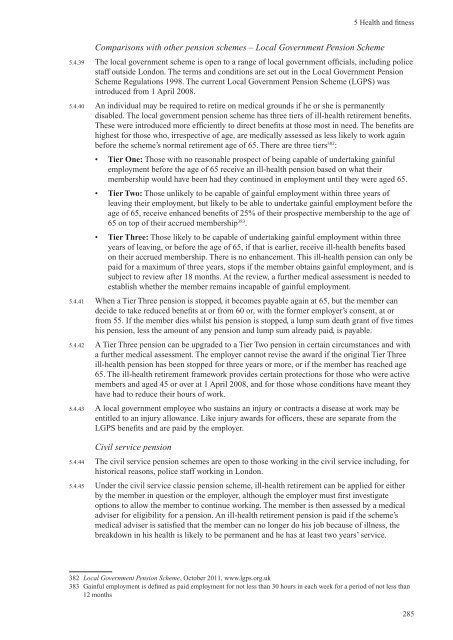Independent Review of Police Officer and Staff Remuneration and ...
Independent Review of Police Officer and Staff Remuneration and ...
Independent Review of Police Officer and Staff Remuneration and ...
You also want an ePaper? Increase the reach of your titles
YUMPU automatically turns print PDFs into web optimized ePapers that Google loves.
5 Health <strong>and</strong> fitness<br />
Comparisons with other pension schemes – Local Government Pension Scheme<br />
5.4.39 The local government scheme is open to a range <strong>of</strong> local government <strong>of</strong>ficials, including police<br />
staff outside London. The terms <strong>and</strong> conditions are set out in the Local Government Pension<br />
Scheme Regulations 1998. The current Local Government Pension Scheme (LGPS) was<br />
introduced from 1 April 2008.<br />
5.4.40 An individual may be required to retire on medical grounds if he or she is permanently<br />
disabled. The local government pension scheme has three tiers <strong>of</strong> ill-health retirement benefits.<br />
These were introduced more efficiently to direct benefits at those most in need. The benefits are<br />
highest for those who, irrespective <strong>of</strong> age, are medically assessed as less likely to work again<br />
before the scheme’s normal retirement age <strong>of</strong> 65. There are three tiers 382 :<br />
• Tier One: Those with no reasonable prospect <strong>of</strong> being capable <strong>of</strong> undertaking gainful<br />
employment before the age <strong>of</strong> 65 receive an ill-health pension based on what their<br />
membership would have been had they continued in employment until they were aged 65.<br />
• Tier Two: Those unlikely to be capable <strong>of</strong> gainful employment within three years <strong>of</strong><br />
leaving their employment, but likely to be able to undertake gainful employment before the<br />
age <strong>of</strong> 65, receive enhanced benefits <strong>of</strong> 25% <strong>of</strong> their prospective membership to the age <strong>of</strong><br />
65 on top <strong>of</strong> their accrued membership 383 .<br />
• Tier Three: Those likely to be capable <strong>of</strong> undertaking gainful employment within three<br />
years <strong>of</strong> leaving, or before the age <strong>of</strong> 65, if that is earlier, receive ill-health benefits based<br />
on their accrued membership. There is no enhancement. This ill-health pension can only be<br />
paid for a maximum <strong>of</strong> three years, stops if the member obtains gainful employment, <strong>and</strong> is<br />
subject to review after 18 months. At the review, a further medical assessment is needed to<br />
establish whether the member remains incapable <strong>of</strong> gainful employment.<br />
5.4.41 When a Tier Three pension is stopped, it becomes payable again at 65, but the member can<br />
decide to take reduced benefits at or from 60 or, with the former employer’s consent, at or<br />
from 55. If the member dies whilst his pension is stopped, a lump sum death grant <strong>of</strong> five times<br />
his pension, less the amount <strong>of</strong> any pension <strong>and</strong> lump sum already paid, is payable.<br />
5.4.42 A Tier Three pension can be upgraded to a Tier Two pension in certain circumstances <strong>and</strong> with<br />
a further medical assessment. The employer cannot revise the award if the original Tier Three<br />
ill-health pension has been stopped for three years or more, or if the member has reached age<br />
65. The ill-health retirement framework provides certain protections for those who were active<br />
members <strong>and</strong> aged 45 or over at 1 April 2008, <strong>and</strong> for those whose conditions have meant they<br />
have had to reduce their hours <strong>of</strong> work.<br />
5.4.43 A local government employee who sustains an injury or contracts a disease at work may be<br />
entitled to an injury allowance. Like injury awards for <strong>of</strong>ficers, these are separate from the<br />
LGPS benefits <strong>and</strong> are paid by the employer.<br />
Civil service pension<br />
5.4.44 The civil service pension schemes are open to those working in the civil service including, for<br />
historical reasons, police staff working in London.<br />
5.4.45 Under the civil service classic pension scheme, ill-health retirement can be applied for either<br />
by the member in question or the employer, although the employer must first investigate<br />
options to allow the member to continue working. The member is then assessed by a medical<br />
adviser for eligibility for a pension. An ill-health retirement pension is paid if the scheme’s<br />
medical adviser is satisfied that the member can no longer do his job because <strong>of</strong> illness, the<br />
breakdown in his health is likely to be permanent <strong>and</strong> he has at least two years’ service.<br />
382 Local Government Pension Scheme, October 2011, www.lgps.org.uk<br />
383 Gainful employment is defined as paid employment for not less than 30 hours in each week for a period <strong>of</strong> not less than<br />
12 months<br />
285

















